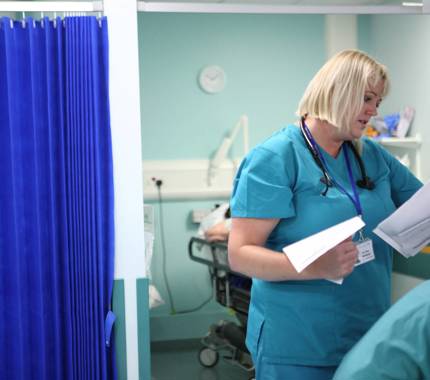Pay offer for consultants following intense negotiations with Department of Health
The Northern Ireland consultants committee (NICC) has secured a pay offer for consultants working in Northern Ireland that they feel is a positive step towards full pay restoration.
They are encouraging all members to vote yes on this offer.
A revised consultant pay scale is proposed which provides higher career earnings and the highest starting consultant salary in the UK.
Consultant members in Northern Ireland will now be asked to vote on whether to accept this offer through a referendum that will open on 31 July until 21August.
Why we are asking for full pay restoration
For years, consultants here have been working harder and longer, with more complex cases in a much more challenging environment, whilst a crisis built in the health service. Despite the significant additional pressures our pay has remained the same and it no longer reflects the level of responsibility or clinical risk we undertake every day.
Since 2008/09, our basic pay has experienced real terms (RPI) pay cut of 28.8%.
Colleagues in Ireland under the new Sláintecare contract are paid much higher rates than we are in Northern Ireland and we are already seeing colleagues choosing to work across the border. The government here needs to realise that with increasing consultant vacancies in the Irish health system there is enormous potential for more doctors from Northern Ireland choosing to work there with better terms and conditions.
The pay offer that Northern Ireland consultants will now vote on whether to accept is a higher percentage investment than deals recently accepted by both Wales and England consultants. The Northern Ireland pay offer also provides the highest starting salary for consultants in the UK and higher career earnings than England.
Consultants here have a complex contractual pay system with eight incremental pay rises intended to reflect progressive expertise and increased value in the role. It takes 19 years to reach the top of the pay scale, and this was originally constructed to work with a final salary pension scheme and a retirement age of 60. The new pay scales proposed under the pay offer will see consultants now reach the top of the pay scale in 15 years.
Incremental progression does not mitigate the necessity for the pay scale itself to be uplifted at least in line with inflation. The impact of pay restraint on consultants is cumulative and its effects compound over time as can be seen below.
Consultant pay in Northern Ireland if it had kept up with RPI inflation.
| Pay points | 2008/09 | 2023/24 | 23/24 (if kept up with RPI) | Difference |
|---|---|---|---|---|
| 1 | £73,403 | £94,127 | £133,615 | £39,488 |
| 2 | £75,701 | £97,076 | £137,799 | £40,723 |
| 3 | £78,000 | £100,024 | £141,983 | £41,959 |
| 4 | £80,298 | £102,970 | £146,166 | £43,196 |
| 5 | £82,590 | £105,908 | £150,339 | £44,431 |
| 6 | £88,049 | £112,911 | £160,276 | £47,365 |
| 7 | £93,508 | £119,912 | £170,213 | £50,301 |
| 8 | £98,962 | £126,907 | £180,141 | £53,234 |
Consultant (NI) take-home pay and inflation (real value)

The BMA’s calculations show that pay awards for consultants in Northern Ireland from 2008-09 to 2022-23 have delivered a real terms (RPI) pay cut of 28.8%.
CEAs (Clinical Excellence Awards Scheme) and impact on pay
The Department of Health has consulted on a new CEA scheme that closed in February 2024, the findings of which are currently being collated. As part of the pay offer being put to consultants in Northern Ireland, and following a previous public consultation on CEAs, the department will continue plans to implement a new CEA scheme for Northern Ireland to reward excellence and innovation for consultants.
Background
In 2009/10, approximately 50% (686) of the consultant workforce in Northern Ireland held either local or national CEAs, costing in the region of about £14million.
We estimate that by 2019-20 only 300 consultants held awards and we estimate that this would equate to over £26 million in 2020-21. This means many consultants are not being recognised or rewarded for demonstrating excellence in their field of medicine, ultimately benefiting patient care. Collectively consultants are missing out on over £26 million.
We know that because of these real terms decline in our pay, more of us are retiring early, moving overseas, or reducing our hours. It is also making the role of a consultant less and less appealing to prospective consultants, either junior doctors in our own system or those who might want to come and work here. As a result, we continue to see large gaps appearing in the consultant workforce and more pressure on those who remain.
Where we are currently
Following the restoration of the Northern Ireland Assembly in February 2024, the Health Minister said that he intended to apply a pay uplift of 6%, as recommended by the Doctors and Dentists Pay Review Body (DDRB) in 2023, however we are currently still waiting for that to be paid to doctors.
In June 2024 consultants in Northern Ireland voted in favour of taking strike action over pay. The strength of this vote and subsequent planned strike action brought the Department of Health to the negotiating table. Northern Ireland consultants committee has now secured a pay offer which members have been asked to vote on.
How have we reached this point?
As outlined, due to sub-inflationary pay uplifts, over the last 15 years our pay has steadily eroded to the point where we have now experienced a 28.8% real terms pay cut.
Coupled with this has been a sustained period of political instability in Northern Ireland which has meant decisions to address workforce gaps, and stabilising and transforming the health service have not been taken, adding to the pressures doctors face.
While we have engaged in good faith with the DDRB for the last 15 years, the recommendations they have made around pay have not always been implemented by government. The actual application of the pay award in Northern Ireland has generally been extremely slow and it has taken months for it to be paid. This is unacceptable and out-with what happens in the other nations.

Pay activists
- Help build a team at your workplace that drives our campaign locally.
- Share your ideas to help BMA Northern Ireland develop our campaign.
- Recruit new BMA members to strengthen our voice calling for full pay restoration.
- Join or start local events, meetings and activities in support of the campaign.
Keep up to date with our campaign on the BMA NI X (Twitter) and Instagram accounts.






